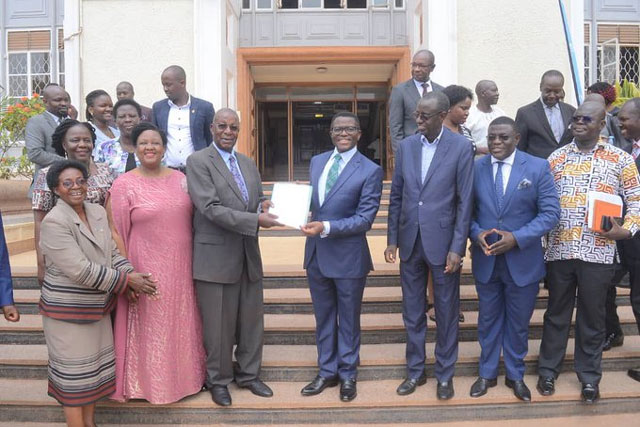
Kampala, Uganda | THE INDEPENDENT | Buganda kingdom has identified five crucial areas that require the central government’s attention to bring about meaningful reforms in the education sector for improved outcomes.
These areas encompass refocusing the curriculum to meet the needs and backgrounds of specific regions, mandatory teaching of local languages, ICT, and agriculture from primary and lower secondary education, and the implementation of vocational education.
Charles Peter Mayiga, the Katikkiro of Buganda kingdom summarized the five areas from the kingdom’s memorandum to the education policy review commission, emphasizing that they should serve as the foundation for revitalizing the education system.
Mayiga made these submissions at a public hearing of the Education Policy Review Commission held at Bulange, Mengo, where the Buganda kingdom was given an opportunity to provide suggestions on the education system as a stakeholder.
Mayiga expressed his concern about the current education system, which he believes is too disconnected from local communities. He questioned why experts do not consider it appropriate for learners to study topics that are relevant to their specific regions, including their respective histories.
Prior to his submission, the Ngaali clan head of Dues Kyeyune emphasized the importance of integrating the pre-colonial form of learning that was utilized by different tribes and kingdoms that now make up Uganda into the current education system.
From his perspective, these systems which are now looked at as “informal” and “local” gave better quality education that would last long in an individual that they would also transfer to the next generation.
The proposal impressed the commission chairperson, Nuwe Amanya Mushega. He recalled that the Baganda and other native tribes had made advancements in various fields, such as agriculture, mining, and medicine, to the extent that there is evidence they conducted surgeries.
Mushega wondered what happened to these areas of learning, which would still be important today, as everyone is now focused on the Western education model. From this perspective, he also urged the Buganda kingdom to provide further information on the pre-colonial education within the kingdom and propose ways to effectively integrate it into the Western education system introduced by missionaries.
“As the leaders correctly pointed out, education existed before the arrival of the colonial powers. Most of this education centered around instilling community values in children and later progressed to vocational training, which was overseen by parents, tribal tutors, or individuals who were assigned specialized roles within their communities,” he said.
In his book titled “History and Development of Education in Uganda,” Professor JC Ssekamwa notes that although there were no schools, classrooms, or reading books, education still occurred during the pre-colonial era and was beneficial to individuals socially, culturally, and economically, as well as for the benefit of society as a whole.
“It is worth noting that the Buganda kingdom is not the only group to propose this idea to the commission. A few weeks ago, the National Planning Authority (NPA) also suggested that for a better education system, the curriculum should be localized to specific regions of the country,” Mushega said.
In their submission, the NPA highlighted that the current curriculum does not reflect the needs of the communities and that people would be more likely to engage with education if what is taught, especially at the basic levels, is drawn from their communities, cultural practices, and occupations.
In addition, the Buganda kingdom also emphasized the importance of teaching local languages to learners before introducing foreign languages such as English and Kiswahili. Mayiga argued that by understanding their own languages, learners would have an easier time grasping other concepts.
“In Uganda, the country adopted a thematic curriculum that aimed at introducing local languages as the medium of instruction from primary one to three. Experts have asserted that learning in a language that is familiar to learners improves reading, writing, and comprehension skills. Despite the benefits of the thematic curriculum, this policy has faced some challenges along the way,” Mayiga said.
“For instance, many teachers who teach in some areas are not well-versed in the local languages. Nevertheless, the Buganda kingdom holds the view that this practice should be strengthened and local languages should be made one of the compulsory subjects, at least for primary-level education.”
Mayiga also emphasized the importance of vocational training and agriculture in the education system. According to him, such skills provide learners with lifelong skills that can be used even if they drop out of school.
He further added that there is also a need for the integration of ICT in the education system, starting from the primary level. While acknowledging the challenges posed by factors such as connectivity, he called for clear policies to be put in place to enable the proposed integration.
In relation to education funding and school fees, Cotlida Nakatte, who heads the committee established by the Buganda Kingdom to investigate necessary reforms, suggested that the government should reassess the policy of providing free education for all citizens. She emphasized that co-funding from parents is crucial for their involvement in their children’s education.
However, Nakatte, stated that the Kingdom generally agrees that school fees and related charges must be regulated to prevent parents from being exploited by schools in the name of quality education.
Like many other entities that have submitted their proposals, the Buganda Kingdom has also stressed the importance of prioritizing early childhood education, establishing better inspection mechanisms, and strengthening continuous assessment, among other measures.
Constituted in 2020, the Amanya Mushega Commission is currently holding public hearings and field visits as they look for solutions to the numerous challenges in Uganda’s education system. The Commission has a one-year mandate to investigate issues in the Education and Sports sector with the goal of producing a new Government White paper that will modernize the country’s Education and Sports system to address 21st-century challenges.
*****
URN
 The Independent Uganda: You get the Truth we Pay the Price
The Independent Uganda: You get the Truth we Pay the Price



